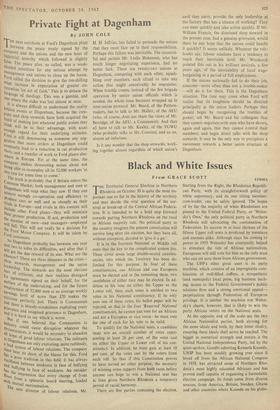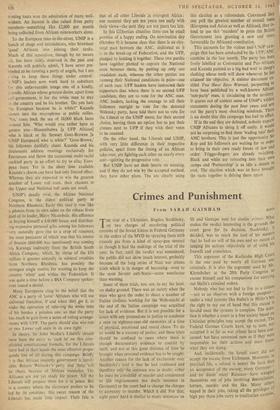Black and White Issues
From GRACE SCOTT
LUSAKA
1-T-1HE Territorial General Election in Northern I Rhodesia on October 30 is quite the most im- portant one so far in the history of the territory and may decide the vital question of the sur- vival or break-up of the Central African Federa- tion. It is intended to be a bold step forward towards putting Northern Rhodesia on the road to African majority rule. No political party in the country imagines the present constitution will survive long after the election, but they have all, without exception, decided to 'give it a go.'
It is in the fourteen National or Middle roll seats that the key to the complicated system lies. These cover seven large double-seated constitu- encies, into which the Territory has been de- limited for this purpose. In four of these constituencies, one African and one European must be elected and in the remaining three, two candidates of either race may be elected. In ad- dition to his vote on either the Upper or the Lower roll, then, each voter is entitled to two votes in his National constituency. If he only uses one of these votes, his ballot paper will be rejected, so that in the four 'Reserved' National constituencies, he cannot just vote for an African and not a European or vice versa—he must vote for one of each for his vote to be valid.
To qualify for the National seats, a candidate must win an overall number of votes repre- senting at least 20 per cent. of the votes cast on either the Upper or Lower roll of his con- stituency. In addition, he must gain at least 10 per cent. of the votes cast by the voters from each roll. So that if this Constitution proves to have served no other purpose, the necessity of winning some support from both races before anyone can hope to win a National seat has at least given Northern Rhodesia a temporary Period of racial harmony.
There are five parties contesting the election. Starting from the Right, the Rhodesian Republi- can Party, with its straightforward policy of white supremacy, and its one sitting member- cum-leader, can be safely ignored. The hopes of by far the majority of white Rhodesians are pinned to the United Federal Party, or Welen- sky's Own,' the only political party in Northern Rhodesia still advocating the continuation of Federation. Its success in at least thirteen of the fifteen Upper roll seats is predicted by members and enemies alike. Although since his coming to power in 1955 Welensky has continually helped to stimulate the tide of African nationalism, Europeans will still vote for him as the only man who can yet save them from African government.
The UFP's other great asset is its party machine, which consists of an impregnable com- bination of well-filled coffers, a sympathetic (and monopoly) local press, big business back- ing, access to the Federal Government's public relations firm and a strong emotional appeal— perpetuation through Federation of European privilege. It is neither the machine nor Welen- sky's charm, however, that is likely to win the party African voters on the National seats.
At the opposite end of the scale are the two African Nationalist parties, both striving for the same ideals and both, by their bitter rivalry, ensuring these ideals shall never be reached. The bigger in numerical strength and stature is the United National Independence Party, led by the quiet-spoken, Gandhi-admiring Kenneth Kaunda. UNIP has been steadily growing ever since it hived off from the African National Congress in 1958, has attracted some of Northern Rho- desia's most highly educated Africans and has proved itself capable of organising a formidable election campaign. Its funds come from diverse sources, from America, Britain, Sweden, Ghana and other countries where Kaunda on his globe- trotting tours won the admiration of many well- wishers. An income is also raised from party members—something like £2,000 per month being collected from African mineworkers alone.
To the European man-in-the-street, UNIP is a bunch of thugs and intimidators, who browbeat 'good' Africans into joining their ranks. Much of this reputation, though by no means ail, has been richly deserved in the past and Kaunda will publicly admit, 'I have never pre- tended to be running a party of angels, butt am eying to keep these things under control.' i NIP's leaders now work bard to substitute
for this unfavourable image one of a kindly, .iendly African whose greatest desire, apart from ,,ef-government, is for the white man to stay :11 the country and be his brother. 'Do you hate
-he European because he is white?' Kaunda .Gouts into the microphone at public rallies. No,' roars back the sea of 10,000 black faces around him. 'Who would you rather have to
govern you—Musumbulwa [a UFP African] who is black or Sir Stewart Gore-Browne [a UNIP European] who is white?' Gore-Brown,' his followers dutifully chant. Kaunda and his lieutenants address meetings exclusively for Europeans and throw the occasional multi-racial cocktail party in an effort to try to allay Euro- pean fears. Yet in the short time available Kaunda's charm can have had only limited effect.
Whereas they are expected to win the greatest number of Lower roll seats, their chances in the Upper and National roll seats are small.
UNIP's deadly rival, the African National Congress, is the oldest political party in Northern Rhodesia. Early this year it rose like a pheenix from its own ashes on the release from gaol of its leader, Harry Nkumbula. His affluence in buying himself a £40,000 house and distribut- ing expensive personal gifts among his followers very naturally gave rise to a crop of rumours, the most persistent of which was that his source of finance (£60,000 was mentioned) was coming via Katanga indirectly from the British South Africa Company, which, by virtue of the £10 million it grosses annually in mineral royalties
from Northern Rhodesia, has possibly the strongest single motive for wanting to keep the-
country 'white' and within the Federation. It was quite a time before a BSA Company spokes- man issued a denial.
Many Europeans cling to the belief that the ANC is a party of 'tame' Africans who will use universal franchise. if and when they get it, to make the operation of relieving the white man of his burden a painless one, so that the party has much to gain from a series of voting arrange- ments with UFP. The party should also win one or two Lower roll seats in its own right.
In theory, Sir John Moffat's Liberals should have been the party to 'cash in' on this com- plicated constitutional formula, for the Liberals have had in their hands the most effective propa- ganda line of all during this campaign. Briefly it is that African majority government is inevit- able. Return Welensky's party and there will be chaos, because of African resistance. The Africans are not yet ready for povver, but the Liberals Will prepare them for it in peace. But in a country where the electorate prefers to be led by its emotions, this sweet reason of the Liberals has made little impact. Their fate is that of all other Liberals in emergent Africa: one moment they are ten years too early with their views—the next they are ten years, too late.
In this Gilbertian situation there can be small promise of a happy ending. On nomination day (October 9) it became clear that there is an elec- toral pact between the ANC, dedicated as it is to the break-up of Federation, and the UFP, pledged to holding it together. These two parties have together plotted to capture the National seats between them, by putting up only one candidate each, whereas the other parties are running their National candidates in pairs—one of each race. UFP leaders have instructed their supporters that where there is no second UFP candidate, they are to vote for the ANC man. ANC leaders, lacking the courage to tell their followers outright to vote for the detested Welensky party, have told them not to vote for the Liberal or the UNIP name, for their second choice, leaving them no option but to put their crosses next to UFP if they wish their votes to be counted.
On the other hand, the Liberals and UNIP, with very little difference in their respective policies, apart from the timing of an African take-over, are fighting each other on nearly every scat—splitting the progressive vote.
But UNIP have set their hearts on winning, and if they do not win by the accepted method, they have other plans. The are clearly using
this election as a referendum. Convinced they can poll the greatest number of overall votes
(European and Asian as well as African), they in- tend to use this 'mandate' to press the British Government into granting a new and more favourable (to Africans) constitution.
This accounts for the vicious anti-UNIP cam- paign that has been conducted by the U FP/ANC combine in the last month. The party has been freely labelled as Communist and Pan-African, and Kaunda painted as a big bad wolf in sheep s clothing whose teeth will show whenever he has attained his objective. A sinister document en- titled You Have Been Warned, purporting to have been published by a well-known African 'non-party' man, is circulating in the territory. It quotes out of context some of UNIP's wildest statements during the past four years and sets out the party's most shocking misdeeds. There is no doubt that this campaign has had its effect.
If in the end they are defeated, nobody expects UNIP Africans to shrug it off easily. It would not be surprising to find them 'wading into' their ANC brothers. This is just the opportunity Sir Roy and his followers are waiting for in order to bring in their own ready forces of law and order. Trigger-fingers are already te Black and white are retreating into their own camps and 'Partnership' is as idle a dream as ever. The election which was to have brought the races together is driving them apart.















































 Previous page
Previous page